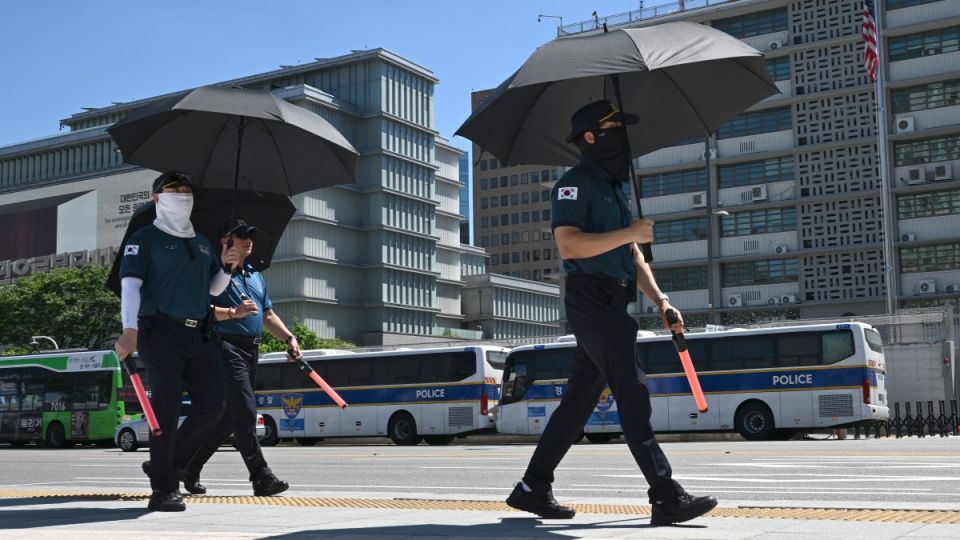October 2, 2025
SEOUL – South Korea and the United States have agreed to establish a dedicated “Korean Investor Desk” at the US Embassy in Seoul to address visa issues faced by Korean companies investing in the US.
The decision comes nearly a month after a US immigration raid on Sept. 4 at a Hyundai-LG battery plant construction site in Georgia, which had led to the detention of more than 300 Korean workers.
The Foreign Ministry said Wednesday the decision was made during the inaugural session of the Korea-US Business Travel and Visa Working Group, held Tuesday in Washington. The working group was launched to discuss ways to improve the US visa system and facilitate entry for Korean business personnel.
The meeting was co-chaired by Jung Ki-hong, South Korea’s ambassador for public diplomacy and government representative for the protection of overseas nationals and consular affairs, and Kevin Kim, senior bureau official for East Asian and Pacific Affairs at the US State Department.
Other participants included officials from Korea’s Ministry of Trade, Industry and Energy, the Ministry of SMEs and Startups, and the US Departments of Homeland Security, Commerce and Labor.
In his opening remarks, US Deputy Secretary of State Christopher Landau reiterated Washington’s commitment to supporting Korean personnel engaged in investment projects and announced additional steps — including the creation of a “Korean Investor Desk” — to assist Korean firms operating in the United States, Seoul’s Foreign Ministry said.
According to the ministry, the new desk will serve as a dedicated channel for communication with Korean companies, offering guidance and consultations on visa issues. It is slated to launch in October, with further details to be provided on the US Embassy’s website.
The State Department also announced the outcome of the meeting on its website.
“The US government is working closely with its Korean allies to advance the US-ROK trade and investment partnership, including by processing appropriate visas for qualified ROK visitors to continue investing in America, in compliance with US laws,” the statement read.
ROK is the acronym for South Korea’s official name, the Republic of Korea.
Tuesday’s session, in addition, clarified activities allowed for those on the B-1 business visitor visa.
The US side reaffirmed that Korean companies may use the B-1 visa — as well as the Electronic System for Travel Authorization program — for tasks such as installing, servicing and repairing overseas-purchased equipment during the course of their US investments, according to the Foreign Ministry.
Most of the Korean nationals detained at the Hyundai-LG battery plant in Georgia last month reportedly held B-1, B-2 or ESTA visas. The B-2 tourist visa was not addressed in the reaffirmation.
At the time, many of the detainees testified that they faced human rights violations, citing poor facilities, shortages of food and water, lack of medical treatment, sleep deprivation and racially discriminatory remarks.
The State Department’s Foreign Affairs Manual, section 9 FAM 402.2, stipulates that the B-1 visa allows an applicant to enter the US to install, service or repair commercial or industrial equipment purchased from abroad if certain conditions are met.
No reports, however, have confirmed that US Immigration and Customs Enforcement conducted the raid based on evidence that the Korean workers engaged in activities beyond the scope of their visa permissions.
The US had previously expressed regret over the Georgia detentions, with Landau conveying the message at the Korea-US vice foreign ministerial talks in September.
Min Jeong-hoon, a professor of Korea-US relations at the Institute of Foreign Affairs and National Security under the Foreign Ministry, said the US reaffirmation can be seen as a diplomatic gesture to ease tensions, though it fell short of officially acknowledging wrongdoing in the detentions.
“From my recent visit to Washington and meetings with officials, I got the impression that the US considers Landau’s earlier expression of regret as sufficient,” Min told The Korea Herald. “So while it would be excessive to interpret this reaffirmation as either an official apology or the US admitting fault in ICE’s enforcement, it nevertheless serves as a message of reassurance to Korean companies.”
Min added that while the working group could lead to discussions on broader visa categories, prospects remain limited.
“The US generally takes a negative view toward expanding foreign labor,” he said. “But given that the Georgia case can be largely attributed to insufficient institutional arrangements at the time, Korea may still push for the creation of an E-4 visa category, if not greater access to the H-1B.”
The so-called E-4 visa was first envisioned under the 1989 Korea-US trade agreement as a Korea-exclusive work visa for professionals, but it has yet to be implemented.
He also stressed the importance of reminding Washington of the benefits it gains from the alliance with Seoul, especially as priorities between restricting immigration and attracting foreign investment often conflict under the Trump administration.
“Even Trump knows that Korean firms and workers are doing what the US cannot in advanced technology sectors,” Min said. “It is crucial to continually underscore the benefits the US derives from the Korea-US relationship.”
flylikekite@heraldcorp.com


